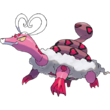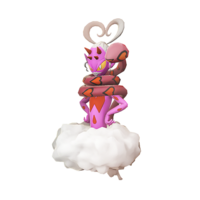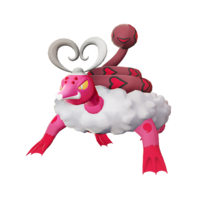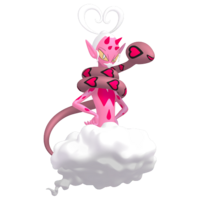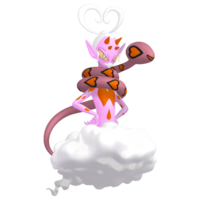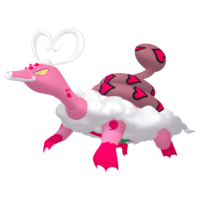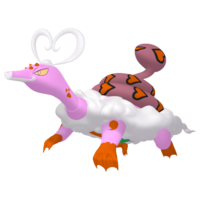|
|
| Line 329: |
Line 329: |
| * In {{g|Legends: Arceus}}'s internal code, Incarnate Forme Enamorus's Ability is {{a|Healer}} instead of {{a|Cute Charm}}. | | * In {{g|Legends: Arceus}}'s internal code, Incarnate Forme Enamorus's Ability is {{a|Healer}} instead of {{a|Cute Charm}}. |
| * Enamorus is the only Pokémon who can have Cute Charm naturally as an Ability that cannot learn {{m|Attract}}. | | * Enamorus is the only Pokémon who can have Cute Charm naturally as an Ability that cannot learn {{m|Attract}}. |
| * Enamorus is the only Pokémon that can only be caught in [[Hisui]]an [[Poké Ball]]s in the main series. | | * Enamorus is the only Pokémon that can only be caught in [[Hisui]]an [[Poké Ball]]s in the main series. However it can be obtained in [[Premier Ball]]s and [[Master Ball]]s in {{g|GO}}. |
|
| |
|
| ===Origin=== | | ===Origin=== |
Enamorus (Japanese: ラブトロス Lovetolos) is a dual-type Fairy/Flying Legendary Pokémon introduced during Generation VIII, in Pokémon Legends: Arceus.
While it is not known to evolve into or from any Pokémon, Enamorus has a second form activated by using the Reveal Glass. Its original form, Incarnate Forme, will then become Therian Forme.
Along with Tornadus, Thundurus, and Landorus, it is a member of the Forces of Nature.
Biology

Enamorus's tail uncoils, glows pink, and takes the shape of a heart during attacks
In Incarnate Forme, Enamorus is a pink, slim humanoid Pokémon, which resembles a genie. It is a female-only species with no male counterpart. On its forehead are four sharp magenta horns. Enamorus has white hair tied back, with thick strands shaped like a heart on top of its head, white lips, and two pointed pink ears on either side of its head with a small strand of hair falling in front of them from the temples. Its eyes are yellow with beady white irises and no visible pupils. The front of Enamorus's body is covered in magenta spots, most of them shaped like diamonds, pebbles, and magatamas. Its thin chest consists of two joined diamond-shaped pectorals, its shoulders are adorned with magatama shapes, and on top of its navel is a teardrop, all colored magenta. It has two spotted thin arms, with five fingers on each hand. Its lower body consists of a trailing cloud, with a long, brown tail resembling a snake wrapped twice around its neck. Enamorus's tail has magenta heart markings lined in black running its span, with a pair in place at the end of its tail resembling eyes and another resembling a mouth.
Enamorus is known as the Herald of Spring and God of Spring. The reason is that it arrived from the sea into the Hisui region. This usually signals the end of winter and the rise of the spring season. Enamorus tends to reside in the Crimson Mirelands. It stays in Incarnate Forme when staying in a region. Enamorus's love was said to have given rise to fresh life in the Hisui region. Enamorus can unleash up to four mini cyclones and surround itself with a cloud shield to protect itself from harm.
Enamorus is the only known Pokémon capable of learning the move Springtide Storm.
Forms
Enamorus has two forms: Incarnate Forme and Therian Forme.
In Therian Forme, Enamorus resembles a flying cloud turtle and snake hybrid Pokémon. The feet are magenta three-toe flippers connected to pink arms with single magenta, magatama-shaped spots on the front legs. The trailing cloud now rings its body, leaving bare its pink belly, with the end having a small cloud tail; its belly has a green gem where its navel should lie. The long, brown snake-like tail is coiled on the cloud body, acting as the top of its shell; the false snake head remains, as do the heart-shaped markings along it. Its pink head now resembles a long-nosed turtle, with a long neck that protrudes directly from the cloud ring. Enamorus retains the four magenta horns on its forehead, but they are stubbier. The tip of its nose is white and heart-shaped, connected to a curved white mustache that extends to both sides of its nose. It retains its yellow eyes with beady white irises and short white hair resembling a hair bun with strands shaped like a heart on top.
Therian Forme Enamorus is known to be vengeful to those who disrespect any form of life. It will descend from the clouds and deliver a wrathful, ruthless punishment in the process. The Therian Forme of Enamorus is believed to be the true form of Enamorus. It is known to travel around oceans in its Therian Form in search of a region to reside in. The Therian Forme of Enamorus was first discovered by the Celestica people who resided in Hisui and worshiped it.
In the TCG
- Main article: Enamorus (TCG)
Game data
Pokédex entries
| This Pokémon was unavailable prior to Generation VIII.
|
| Generation VIII
|
|
Galar
#—
|
|
Sinnoh
#—
|
|
Hisui
#234
|
| This Pokémon has no Pokédex entries in Sword, Shield, Brilliant Diamond, and Shining Pearl.
|
| Incarnate Forme
|
| Legends: Arceus
|
When it flies to this land from across the sea, the bitter winter comes to an end. According to legend, this Pokémon's love gives rise to the budding of fresh life across Hisui.
|
| Therian Forme
|
| Legends: Arceus
|
A different guise from its feminine humanoid form. From the clouds, it descends upon those who treat any form of life with disrespect and metes out wrathful, ruthless punishment.
|
|
|
|
|
Game locations
| This Pokémon was unavailable prior to Generation VIII.
|
|
|
|
|
Stats
Base stats
Due to the different way stats are calculated in Pokémon Legends: Arceus, exact minimum and maximum stats are not shown in these tables.
Incarnate Forme
| Stat
|
Range
|
| At Lv. 50
|
At Lv. 100
|
74
|
|
134 - 181
|
258 - 352
|
115
|
|
108 - 183
|
211 - 361
|
70
|
|
67 - 134
|
130 - 262
|
135
|
|
126 - 205
|
247 - 405
|
80
|
|
76 - 145
|
148 - 284
|
106
|
|
99 - 173
|
195 - 342
|
Total: 580
|
Other Pokémon with this total
|
- Minimum stats are calculated with 0 EVs, IVs of 0, and (if applicable) a hindering nature.
- Maximum stats are calculated with 252 EVs, IVs of 31, and (if applicable) a helpful nature.
|
Therian Forme
| Stat
|
Range
|
| At Lv. 50
|
At Lv. 100
|
74
|
|
134 - 181
|
258 - 352
|
115
|
|
108 - 183
|
211 - 361
|
110
|
|
103 - 178
|
202 - 350
|
135
|
|
126 - 205
|
247 - 405
|
100
|
|
94 - 167
|
184 - 328
|
46
|
|
45 - 107
|
87 - 210
|
Total: 580
|
Other Pokémon with this total
|
- Minimum stats are calculated with 0 EVs, IVs of 0, and (if applicable) a hindering nature.
- Maximum stats are calculated with 252 EVs, IVs of 31, and (if applicable) a helpful nature.
|
Type effectiveness
| Under normal battle conditions in Generation IX, this Pokémon is:
|
|
|
|
|
|
|
|
|
|
|
|
|
Learnset
|
|
|
|
- Bold indicates a move that gets STAB when used by Enamorus
- Italic indicates a move that gets STAB only when used by an Evolution of Enamorus
|
|
|
|
|
- Bold indicates a move that gets STAB when used by Enamorus
- Italic indicates a move that gets STAB only when used by an Evolution or an alternate form of Enamorus
|
|
|
|
|
- Moves marked with an asterisk (*) must be chain bred onto Enamorus
- Bold indicates a move that gets STAB when used by Enamorus
- Italic indicates a move that gets STAB only when used by an Evolution of Enamorus
|
Side game data
Incarnate Forme
Therian Forme
Form data
Enamorus has two interchangeable forms: Incarnate Forme and Therian Forme. By default, Enamorus is in its Incarnate Forme. When exposed to the Reveal Glass, it changes into its Therian Forme; if exposed to the Reveal Glass again, it reverts back to its Incarnate Forme. The two forms have different base stats, Abilities, and cries. Its Therian Forme only has one possible Ability, despite its Incarnate Forme also having a Hidden Ability.
Evolution data
Sprites
| This Pokémon was unavailable prior to Generation VIII.
|
|
|
|
|
Trivia
Origin
In Incarnate Forme, Enamorus may be based on Ugajin, a harvest and fertility kami represented with the body of a snake and the head of a man or woman. Enamorus appears to be based on the female deity, which was syncretized with Benzaiten, a Japanese Buddhist deity who originated from the Hindu goddess Saraswati. In addition, it may be inspired by other snake-bearing goddesses, especially Manasa in Hinduism and Bodhisattva Janguli in Chinese Esoteric Buddhism, who symbolized the triumph over evil snakes or dragons, and were worshipped for the cure of snake venom and patronage of fertility. Its association with spring may also draw inspiration from the ancient Mesopotamian goddess Inanna or Ishtar, who represented the planet Venus and the transition into spring in Babylonian astrology.
Like the other members of the Forces of Nature, it may also have drawn some inspiration from Jinn or an Anemoi. For the latter it may be specifically inspired by the west wind Zephyrus, who is associated with flowers, the springtime, and procreation, which is shown in the Pokémon's ability to bring life and its signature move, Springtide Storm. It also shares similarities with the Mayan depiction of Kukulkan at Yaxchilan. The way Enamorus's snake-like tail is wrapped around its neck may be a reference to constriction, a hunting method used by snakes, or to the feather boa, an accessory worn around the neck.
In Therian Forme, Enamorus may be based on reptiles, namely a softshell turtle and a snake. It may also draw inspiration from the Black Tortoise (Chinese: 玄武 Xuánwǔ) of the Chinese Four Symbols; like Enamorus, the Black Tortoise is usually depicted with a snake wrapped around it. However, despite Enamorus being associated with spring, the Black Tortoise represents winter. Therian Forme Enamorus's Pokédex entry, which mentions it punishing those who disrespect life, may be inspired by stories of turtle eaters being revenged by demonized softshell turtles in Edo-era literary sketches, such as Hokuetsu Kidan and Kaidan Tabi no Akebono. Its form difference could also draw inspiration from the Edo-era superstition that softshell turtles are capable of shapeshifting.
Name origin
Enamorus may be a combination of enamor, amorous, and Aeolus (ruler of the winds in Greek mythology).
Lovetolos may be a combination of love and Αἴολος Aiolos (Greek name for Aeolus). It can also be taken to mean ラブとロス rabu to rosu (love and loss).
In other languages
| Language
|
Title
|
Meaning
|
 Japanese Japanese
|
ラブトロス Lovetolos
|
From love and Αἴολος Aiolos, also possibly ラブとロス rabu to rosu
|
 French French
|
Amovénus
|
From amour and Vénus
|
 Spanish Spanish
|
Enamorus
|
Same as English name
|
 German German
|
Cupidos
|
From Cupido and Aiolos
|
 Italian Italian
|
Enamorus
|
Same as English name
|
 Korean Korean
|
러브로스 Reobeuroseu
|
Partial transcription of Japanese name
|
 Mandarin Chinese Mandarin Chinese
|
眷戀雲 / 眷恋云 Juànliànyún
|
From 眷戀 / 眷恋 juànliàn, 戀 / 恋 liàn, and 雲 / 云 yún
|
 Cantonese Chinese Cantonese Chinese
|
眷戀雲 Gyunlyúnwàhn
|
From 眷戀 gyunlyún, 戀 lyún, and 雲 wàhn
|
|
|
|
| More languages
|
 Thai Thai
|
เลิฟโทลอส Loeptholot
|
Transcription of Japanese name
|
|
|
|
Related articles
External links

|
This Pokémon article is part of Project Pokédex, a Bulbapedia project that aims to write comprehensive articles on each Pokémon species, as well as Pokémon groups and forms.
|
 For other sprites and images, please see Enamorus images on the Bulbagarden Archives.
For other sprites and images, please see Enamorus images on the Bulbagarden Archives.

